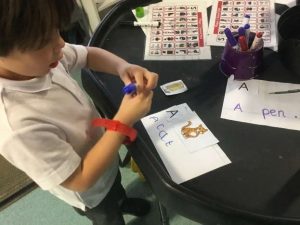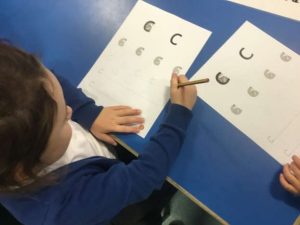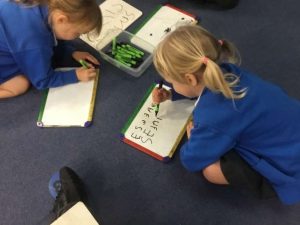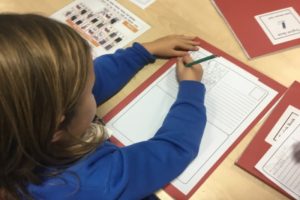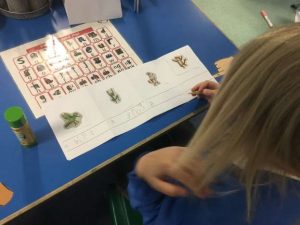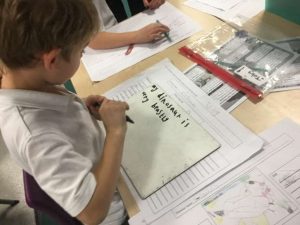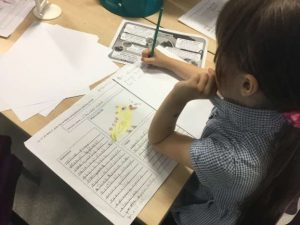Writing
Intent:
Writing is a crucial part of our curriculum and all children from Early Years through to Year 2 are provided with many opportunities to develop and apply their writing skills across the curriculum in a variety of ways. Early writing is encouraged through a wide range of mark making opportunities in EYFS, both indoors and outdoors, and each classroom has designated writing areas where this enthusiasm for writing can be encouraged. We ensure that all children are exposed to high quality, engaging texts across the whole curriculum which model excellent writing practices across a broad range of genres. We adapt/tailor our curriculum and provide opportunities for children to lead their own learning and interests.
As part of our writing curriculum we also ensure that time is spent on supporting children to make links between phonics, reading and writing and endeavour for all pupils to acquire a growing vocabulary, solid understanding of grammar and the ability to spell new words effectively choosing and applying spelling patterns and rules that have been taught. We are inclusive of all children, including SEND by providing the appropriate scaffolding, support and writing tools those children need in their writing process to experience success.
All staff have high expectations and nurture a culture where children are encouraged to take pride in the presentation of their writing. All children are challenged and encouraged to take risks and view mistakes as a positive part of the learning process.
Aims:
At Cupernham Infant School, we believe that all children are writers. We aim to inspire children to write by introducing a diverse range of high-quality, vocabulary-rich texts which are linked to their topics. We have a strong focus on language development for our children because we know that speaking and listening are crucial skills for reading and writing fluently in all subjects areas in order to communicate their ideas and emotions effectively. We want children to develop their fine and gross motor skills to be able to hold a pencil effectively and write comfortably.
Implementation:
At Cupernham Infant School, we value writing as a crucial life skill and believe that this begins with gross and fine motor development before children start school. By the time children leave us, they will confidently form every letter and will be beginning to join two letters and more using diagonal joins necessary for cursive writing. We use Little Wandle letter formation to teach children to form letters correctly, beginning and finishing in the correct place.
More information can be found in our Handwriting Policy available here:
HANDWRITING POLICY
We believe writing should be a creative/developmental process both at a functional and an imaginative level. It is our aim to provide a balance of child-led and adult-led experiences for all children that meet the curriculum expectations of each age range. These include: sharing high-quality stories and poems learning a range of nursery rhymes and action rhymes activities that develop focused listening and attention, including oral blending attention to high-quality language.
All attempts at writing are valued and we know that all children have potential to be successful writers. Transcriptional skills are taught alongside the creative aspects. Immersion in reading, talk and preparation for writing is essential to the writing development process.
1) Shared writing:
This is modelled by the teacher as the expert writer with contributions from the children. This is teacher-led writing with children watching and contributing ideas. Shared writing is not exclusive to English sessions and can be taught within Foundation subjects. The emphasis may be on the generation of ideas, grammatical awareness, spelling and phonics, compositional, transcriptional, and presentational and text level skills or other key strategies needed in writing. Not all of these can be modelled in one session, but the teacher as the expert writer leads the cumulative writing process.
2) Guided writing that targets children at their point of writing:
Guided writing takes place in small groups with a teaching focus using targets and writing already modelled. Each guided group writes with a teacher or LSA during daily sessions as part of the teaching and learning schedule for that text or week an adult intervening as appropriate. Children receive individualised support from the teacher at the point of writing or mark making as appropriate. During guided sessions, the adult supporting the group will share targets achieved and mark the child’s work according to the whole school marking policy.
3) Opportunities for developmental writing:
At Cupernham Infant School children experience writing in a range of settings and opportunities for developmental writing is available through all areas of learning and throughout the learning environment. Children’s own attempts at early writing are celebrated and promoted, alongside the direct teaching of the key skills that will enable the children to progress through the stages of writing development. Children are given opportunities to develop their confidence and practice their writing skills.
5) Writing environment:
Cupernham Infant School celebrates quality writing through displays of work in both handwritten and typed form as well as signs and labels. All classrooms should have attractive and well-equipped resources for writing that children can access through a writing area or table. Opportunities for writing are planned for and accessible throughout the learning environment and school day.
Functional and creative writing including poetry are demonstrated and promoted by staff and visitors.
Impact:
The main intended impact of our delivery of Writing is that all pupils enjoy writing across a range of genres, can write for a range of purposes and audiences, and become confident and effective communicators, making good progress from their own personal starting points. We aim for all children to have the writing skills and writing stamina needed for the next stage of their education. Children will develop a varied vocabulary that they can use across the curriculum and can apply spelling rules and grammatical concepts in their work. We also aim to ensure that our children are proud of their writing and have opportunity to see it on display and shared with others in the school and with their families.
Writing Overview:
